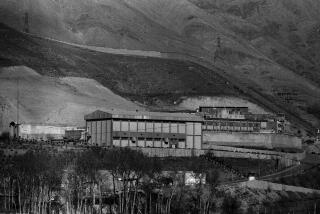U.S. Ends Talks With Iran Over Al Qaeda Links
- Share via
WASHINGTON — In the wake of the Saudi bombings, the United States has broken off talks indefinitely with Iran because of intelligence indicating that Al Qaeda operatives have taken refuge in the Islamic Republic.
The Bush administration has notified Iran, through Swiss, British and U.N. envoys, that it expects to see action against Al Qaeda before resuming the talks on security and regional issues, held under U.N. auspices.
The latest talks were scheduled to be held in Geneva today but were canceled by the White House, according to administration officials.
“We decided not to continue talks because of what happened in Saudi Arabia and the potential links to people who are now in Iran. We’re finding other ways to tell the Iranians that we want to know whatever they know about Al Qaeda in Iran,” said a senior administration official.
“If they are sincere about these talks or this subject, they’ll want to help in any way they can,” he said.
The break in talks comes at a delicate moment for both governments. The Bush administration has been deeply divided over whether to foment opposition to the current regime, ignore it as internal forces press for change or engage Tehran on key regional and security issues. Iran’s government has been split over judging the sincerity of U.S. intentions.
Washington had viewed the dialogue as a way to deal directly with Tehran on mutual security concerns, most notably the threat from Al Qaeda. The discussions, which began as a forum on Afghanistan among eight nations, had evolved into direct talks between Iran and the United States on Iraq and other issues.
Last week, the State Department said the talks had become increasingly useful, after almost a quarter-century of tensions.
But Al Qaeda’s suspected role in the three Saudi bombings last week led the White House to question the effectiveness of talking with the Iranian government, administration officials said Tuesday.
Recent intelligence, including intercepted communications from Al Qaeda operatives in Iran, indicates that at least some parts of the Iranian government are allowing the militants to remain in the country, U.S. officials said.
“We have hard intelligence that Iran has been used as a base of Al Qaeda operations. Is this witting or unwitting? Recently there’s been concern that Iran’s position has changed and there are serious question marks that some quarters have about whether there’s a new Iran-Al Qaeda nexus that would represent a serious new threat,” said a senior U.S. official.
Although Iran has vehemently denied that it is harboring Al Qaeda, U.S. officials say Saif Adel, a top Al Qaeda official, and Saad bin Laden, the son of Al Qaeda founder Osama bin Laden, both may now be in Iran. U.S. officials concede, however, that the government of President Mohammad Khatami may not be fully aware of what religious hard-liners and their supporters may be doing.
“The Iranian government is, unfortunately, not a single entity. Some may know about the Al Qaeda presence and others may not. It’s important to get at the bottom of this as soon as possible,” said the senior administration official.
The State Department approach of trying to work with Tehran has prevailed with tentative support from the White House, despite opposition among Pentagon policymakers and condemnation from neo-conservatives who would prefer to either pressure or ignore Tehran.
“A lot of people are feeling betrayed. This dialogue was based on the assumption that we can engage with the Iranians constructively on issues like Al Qaeda. If we can’t trust that supposition anymore, we have to question this kind of exchange,” said the senior U.S. official.
But Iran has also been deeply divided about how much to engage with the United States. Ayatollah Ali Khamenei, Iran’s supreme leader, only reluctantly and after many years agreed to allow Iranian diplomats to talk more directly to their American counterparts, according to Iranian officials.
In Tehran, officials who promoted the dialogue feel burned by U.S. accusations over the past week, according to Iranian sources. They point to past announcements that they have expelled dozens of Al Qaeda operatives.
“People here resent the U.S. approach of the past few days. The U.S. knows that Iran has taken decisive action against Al Qaeda. We’ve tried to maintain some sort of calm after all this, but this development could create a chain reaction that would be hard to contain,” said an Iranian official.
Iranian analysts say the suspension of talks will further alienate Khamenei and strengthen his long-standing suspicions of U.S. intentions.
“This proves his belief that the United States can’t be trusted and that it wants only to play a game to see what it can get out of Iran,” said a prominent analyst.
Other Iranian sources claim Iran would not have supported any group targeting Saudi Arabia. In stark contrast to the many years of deep animosity between the two Persian Gulf giants, relations are now deepening strategically and economically, they said.
Administration officials said Tuesday they are not abandoning the talks. The action was taken in part out of a hope that the action would “nudge the tectonic plates inside Iran,” lead to movement on the issue and allow the two countries to resume talks and cooperation.
More to Read
Sign up for Essential California
The most important California stories and recommendations in your inbox every morning.
You may occasionally receive promotional content from the Los Angeles Times.










